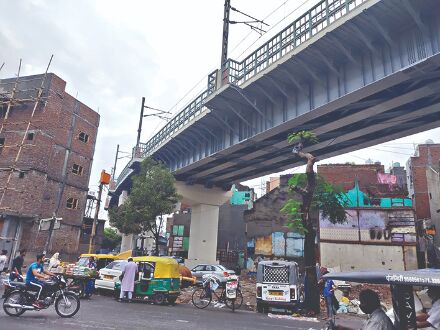For 4 phases of Delhi Metro, 4,000 jhuggis relocated: RTI

New Delhi: To make way for construction of its corridors across the four phases, the Delhi Metro has so far demolished and relocated nearly 7,000 properties, which includes close to 4,000 jhuggis and 3,000 residential, non-residential and other structures, an RTI response from DMRC (Delhi Metro Rail Corporation) showed.
Filed by Millennium Post, the RTI reply said that in Phase 1, which began construction in 1998, 4,769 residential and non-residential structures were resettled, including 2,678 jhuggis. In Phase 2, 1483 properties were relocated, including 1,016 jhuggis. Similarly for Phase 3, 604 structures were resettled, which included 229 jhuggis, while a total of 70 residential and non-residential properties were demolished and resettled for Phase 4.
DMRC claims that it has provided residents who have been displaced with newly developed flats close to their previous residence or given compensation for the same.
Millennium Post spoke to residents of the largest displacement project that DMRC had undertaken so far, those among the 108 residents of 400 homes in Trilokpuri's Block 15, who were shifted to flats built at a short distance from their previous homes. More than a year after they were resettled amidst hue and cry, they lamented the lack of basic amenities and a dwindling source of income, nothing in comparison to their previous residence.
For at least three years, a 1.5 km link from Mayur Vihar Pocket 1 to Trilokpuri was missing in the Pink Line connecting Majlis Park to Shiv Vihar due to this rehabilitation issue and was thrown open to commuters only last month.
Umar Daraz (48) said that at his previous house, he had a ration, AC and a fridge repairing shop which earned him a decent amount to run his house. "The shop also got destroyed along with my house...now I rent out the area around my flat to e-rickshaws...this income is nowhere close to what I earned from my shops. I told the metro authorities to at least spare our shops but they didn't budge," he said, adding that the tracks being so close to their homes leads to high noise levels.
His wife Hazara Begum said that their previous home, despite being old, had solid walls made of durable construction material but the flats provided by DMRC, she claimed, were made of low quality with weak structure. "One can't even drill a screw in these walls and hang a picture as it won't hold up…it's always difficult to let go of your first house," she said. Few residents also complained of erratic water supply ever since they were shifted to these flats and claimed that DMRC has not responded to their grievance yet.
77-year-old Abdul Alim, another resident, who runs a welding shop outside his flat along with his son, said: "I had been living there as long as I can remember...I had a similar welding shop there and that was much more profitable...I earn around 20 to 25 percent less than what I did there...mostly because of the crowd and location…"
Residents also complained that metro hasn't provided any provision of security in these flats. "In our previous homes, we had separate gates for each house which made the whole locality safe...here there is only one gate and a short railing so anyone can jump and enter inside," a resident said.
Vakeela (60), holding her grandson in her lap, said that initially it was very difficult to adjust, but she has now made peace with the place. "At that time several people had died just at the thought of their houses being demolished, initially metro tried to shift us to a far-flung area but the residents subsequently moved the Delhi High Court and this area was designated," she said.
Meanwhile, Irfan, along with his father, while inspecting the flat which he and his family are soon going to shift to as the house opposite theirs, across the road, had developed cracks due to the metro track, said: "Metro authorities said they will demolish that house and hence are shifting us as a measure of caution," he said.
Experts opined that mutual consensus has to be arrived at with the local residents before undertaking such projects. "If the residents have been facing issues, they have the option of moving court…metro has to provide due compensation and is accountable to their grievances," said Dr. P K Sarkar, former professor at School of Planning and Architecture (SPA). He said that while DMRC cannot shift responsibility for the displaced, "in times when you don't have an option, you go ahead with the construction but strike a suitable compromise that satisfies the majority".
Similarly, Dr. Shravan Saha, former Director of SPA, said that such projects do entail large-scale displacement of residents but adequate compensation in line with their loss might reduce the impact on their livelihood. "They should be informed several months back about the possible displacement and and metro should ensure that it can somehow compensate loss of employment due to the project by providing skill training such persons," he said.
DMRC claims that the rehabilitation process has been completed in accordance with laws and cooperation of residents. "We make all efforts to plan alignments through areas where no displacement is necessary. Only in exceptional cases, where no other alternative is available, rehabilitation plans are taken up," it said, adding that despite constructing nearly 390 kms of lines in the NCR, "there are very few land pockets where displacement was necessitated".



